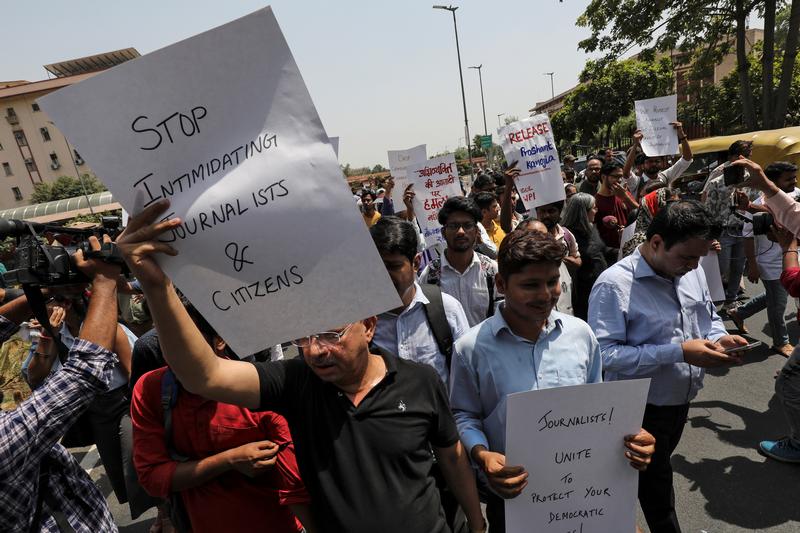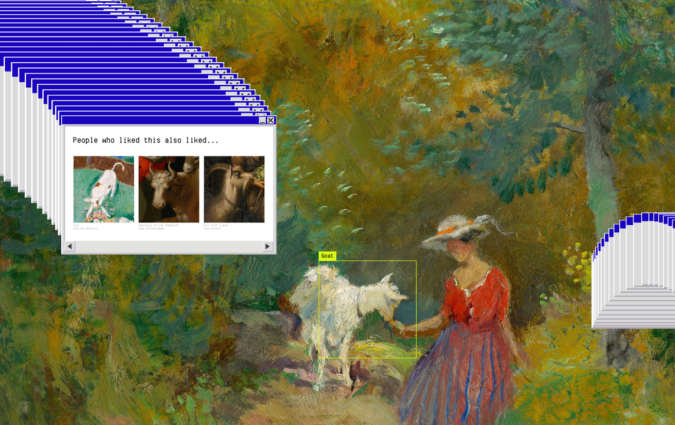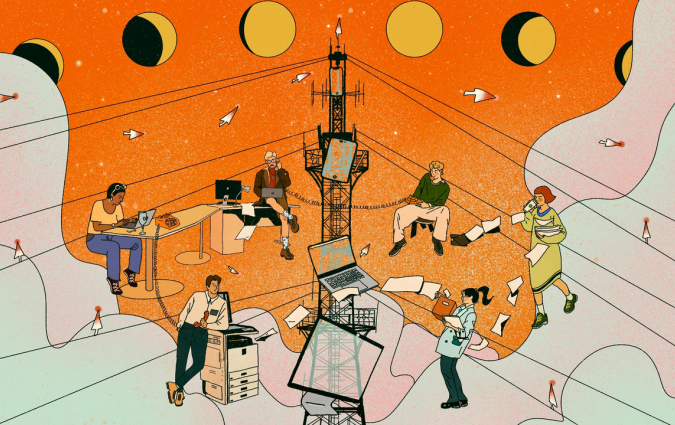Should protecting the press be a priority for the G20? These global editors think so

Journalists protest against the arrest of journalists for their posts on social media in New Delhi in 2019. REUTERS/Anushree Fadnavis
Leading editors from around the world met earlier this week to discuss common challenges faced by the news media as well as possible solutions in a digital meeting hosted by Indian journalists mirroring the G20 New Delhi summit taking place this week.
The event, the M20 or the Media 20 Online Summit, was held on Wednesday and was an initiative by Indian media organisations who are concerned about the dangerous decline of press freedom in their country and beyond.
The meeting was convened by Indian journalist and editor Siddharth Varadarajan, who founded digital-born newspaper The Wire in 2015 along with Sidharth Bhatia and M. K. Venu. Varadarajan gave the 2019 Reuters Memorial Lecture, in which he spoke about the future of journalism in his home country.
Also present were high-profile editors from Australia, Brazil, Canada, France, Indonesia, Italy, South Africa, the UK and the US.
Introducing the session, Varadarajan pointed out that the issue of press freedom is not a priority for discussion at G20 meetings. “None of the problems that they [the G20] hope to solve can be solved if the media in their country is not free,” he said. Varadarajan concluded his opening remarks by expressing hope that the M20 initiative can continue to shadow future G20 summits, like the next one in Brazil.
Participants then began to share their views about the challenges the press faces in their own countries and any possible solutions to them.
Money and tech pressures
Representatives from countries where the challenges faced by journalists are not as existential as elsewhere in the world focused on the impact of modern technology on the media industry.
Maurizio Molinari, editor-in-chief of Repubblica, one of the main national newspapers in Italy, outlined what he sees as the three priorities for media across the G20. The first is “the need to protect the copyright of our intellectual content threatened by actors in the digital arena,” he said. This is a threat to the financial models of the news industry, as well as to the integrity of news, he explained.
The second issue to be addressed is online disinformation: “Our way of working, the way that we look for news and express opinions is threatened by fake news on social networks.”
The third is a political trend that Molinari is seeing around the world: “Those holding executive power want to concentrate more and more power in their hands. They do not like the balance of power and they would like the media world not to exercise the right of freedom of expression.”
Nelson de Sá, Asia correspondent for Brazilian newspaper Folha de S. Paulo, emphasised the need to find a business model to sustain independent and critical journalism. This is particularly important because in Brazil, the power of the government over the media is felt through advertisement agreements, he said, and thus this income stream depends on who is in office, with Bolsonaro cutting government ads on newspapers and TV stations, and Lula recently reintroducing them.
AI is also a growing focus for Folha, De Sá said, echoing Molinari’s concerns for copyright protection when he said a main concern is to safeguard the content of the newsroom from cooptation by AI as much as possible.
James Lamont, Director of Strategic Partnerships at the Financial Times started by acknowledging that in London, where the FT is headquartered, the press doesn’t face existential pressures as colleagues in India do but added: “This is something we can never take for granted.”
Given the FT’s work with correspondents around the world, Lamont is familiar with many of the issues discussed in the meeting and highlighted four possible solutions.
The first issue is misinformation and fake news, which have proliferated in the digital era. These can sway public opinion and cause harm, Lamont said. The solution, he suggested, could come from a partnership like the Trusted News Initiative, where outlets join forces to combat fake news in dialogue with big tech.
The second issue he talked about is generative AI and its applications to journalism. “Will the reader be able to determine what is written by a human and what is written by a bot?” he asked. As an example of a way to begin addressing these concerns, he pointed to the FT’s declared principles around the use of AI, something other publishers have also made public.
The next issue he highlighted was that of cyber-threats against publishers and publishing systems, which in some cases may be state-backed. Bad actors can break in, change content, crash the website, or carry out ransom attacks, Lamont said, adding that countering this requires massive resources and constant vigilance.
The final issue, and a familiar one for media around the world, is the difficulty faced with commercial models. Unable to sustain themselves, smaller regional titles weaken and shut down, which is a blow to diversity of the media, he said.
Facts matter
Alan Rusbridger, editor of Prospect magazine and Chair of the Reuters Institute, pointed to two different types of solidarity which are necessary in the tough economic situation the media finds itself in.
The first is solidarity with other publishers, which may help protect the industry as a whole from external threats like government intervention. The second is solidarity with readers, Rusbridger said, pointing out that a relationship with readers is central to journalism.
French journalist Edwy Plenel, founder of digital newspaper Médiapart, stressed the importance of focusing on independent, fact-based reporting. “My concern is about all the opinions invading our space, while our raison d’etre as the media is to provide facts,” he said.
“There is hope for journalism as long as it fights for economic independence, editorial independence and proves its social usefulness,” Plenel said. This is in contrast to the proliferation of mis- and disinformation and the weaponisation of some modes of communication against facts. “Everywhere, politicians and business interests use opinion against information,” he said.
The news from India
Representatives from some countries documented a recent decline in media freedom as their democracies begin to backslide.
N. Ram, former editor-in-chief of The Hindu, pointed to the very serious media freedom situation in Kashmir, noting the recent shutdown of the local independent outlet Kashmir Walla, with the blocking of its website and social media accounts. Its founder, Fahad Shah, has been in prison for over a year, and some of the paper’s other journalists have also been arrested, N. Ram said.
“There was a time when I believed that India was in an enviable position with regards to freedom of speech and expression, that was 40 years ago,” N. Ram said. “We really rejoiced at that time.”
Despite ups and downs throughout the years, “after the [Indian] emergency, [when the press was censored between 1975 and 1977] I cannot think of any time when the situation was as difficult for the media as now.”
All the main English language channels have been taken over by big businesses, mostly supporting the Modi government, N. Ram said. It’s hard to paint a picture of the media environment as regards non-English language channels because there are so many of them, so N. Ram cautioned against being too negative. However, he also pointed to widespread disinformation and the targeting of some Indian journalists, some of whom have been killed, often with impunity.
Pressures in Africa and the Middle East
Editors from South Africa described persistent threats to journalists in their young democracy, which is finding itself struggling to uphold the values it theoretically espouses. Rochelle de Kock, editor of The Herald & Weekend Post in South Africa, pointed to some issues faced by the media in the country, including a rise in threats and intimidation towards journalists, both in person and online. “Sometimes, the police fail to protect journalists at protests,” she said.
“We have seen a rise in journalists facing physical and verbal threats in person but particularly on social media,” she said. These come from all corners, with politicians targeting individual journalists and then their supporters also coming for journalists. “Some political parties are placing a ban on some journalists reporting on their events” when they’re seen as too critical, she said.
“There’s not enough pushback from people outside of the media industry,” she said, which leaves journalists feeling alone in the face of harassment. Women journalists are particularly prone to attacks, she noted.
De Kock’s arguments were also stressed by Makhudu Sefara, Editor of TimesLIVE, Deputy Editor at the Sunday Times and Deputy Chairman of the South African National Editors Forum. He said that, when he and his colleagues raise concerns with ministers, they agree that the situation is not acceptable, but their actions do not back this up.
“On paper, we are free in South Africa to do our work, but practically this is not yet the rule,” Sefara said.
Turkish journalist Ipek Yezdani shed light on a difficult situation for media freedom in her country. “I would never think I would miss those days when the media was polarised in Turkey because polarisation means pluralism,” Yezdani said. More than 90% of mainstream media in Turkey is either controlled by or owned by the government, she explained.
In the past year, “the number of journalists in prison has decreased but that doesn’t mean pressures on journalists have decreased: they have increased through trials and fines,” Yezdani said. Precarious unemployment and low wages are also significant issues. Journalism is struggling to survive because young people don’t want to join the profession, she added.
Voices from outside the G20
Myanmar is not part of the G20, but Swe Win, editor-in-chief of Myanmar Now, an independent outlet operating in exile, was invited to the summit as the country is a neighbour of India, and is in a particularly bad situation in terms of media freedom that ought to be highlighted, Varadarajan said.
Swe Win denounced the oppression journalists, as well as ordinary people, face at the hands of the military junta: “Myanmar is like North Korea in terms of repression,” he said, lamenting however, that their situation struggles to gain international attention. He also said media outlets reporting on the country are in financial trouble and have not been receiving much international support.
Swe Win requested his colleagues worldwide to give more space in their publications to what’s going on in Myanmar and to be mindful of propaganda operations from the state junta.
Lebanon is not a part of the G20 either, but Kareem Sakka, the publisher of Raseef22, a Beirut-based media platform covering Arab states, was also invited to speak. Sakka spoke on behalf not only of Lebanon but of other Arab countries too. In dictatorships like the ones seen there, “good journalism is state enemy number one,” Sakka said. Large Arabic media are mostly state-owned or controlled, he said, and media advertising is rigged.
“Independent journalism becomes a form of activism as soon as it strays from the official narrative,” Sakka explained. Everything changed in the Arab world with the digital revolution, but we need more progress and more change, he continued.
In some places, low numbers of journalists in prison may give the wrong impression, he said: “In Saudi Arabia, there are no journalists to be jailed.” In that country, people can receive the death sentence for tweets, and censorship is widespread and robust, such that even Google search results are censored, making journalism extremely difficult. “The Arab world should not be abandoned in favour of business deals,” Sakka concluded.






